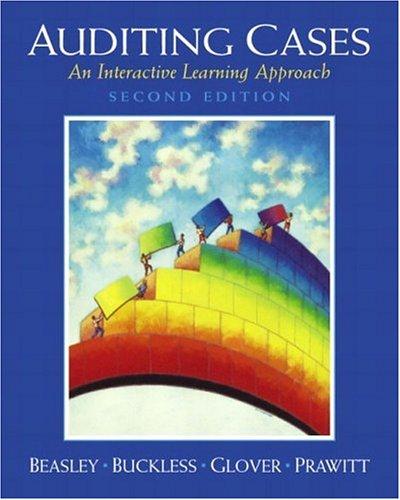Question
Arthur Edward Andersen built his firm, Arthur Andersen & Company, into one of the largest and most respected accounting firms in the world through his
Arthur Edward Andersen built his firm, Arthur Andersen & Company, into one of the largest and most respected accounting firms in the world through his reputation for honesty and integrity. Think straight, talk straight was his motto and he insisted that his clients adopt that same attitude when preparing and issuing their periodic financial statements. Arthur Andersens auditing philosophy was not rule-based, that is, he did not stress the importance of clients complying with specific accounting rules because in the early days of the U.S. accounting profession there were few formal rules and guidelines for accountants and auditors to follow. Instead, Andersen invoked a substance-over-form approach to auditing and accounting issues. He passionately believed that the primary role of the auditor was to ensure that clients reported fully and honestly to the public, regardless of the consequences for those clients. Ironically, Arthur Andersen & Co.s dramatic fall from prominence resulted from its association with a client known for aggressive and innovative uses of accounting gimmicks to window dress its financial statements. Enron Corporation, Andersens second largest client, was involved in large, complex transactions with hundreds of special purpose entities (SPEs) that it used to obscure its true financial condition and operating results. Among other uses, these SPEs allowed Enron to download underperforming assets from its balance sheet and to conceal large operating losses. During 2001, a series of circumstances, including a sharp decline in the price of Enrons stock, forced the company to assume control and ownership of many of its troubled SPEs. As a result, Enron was forced to report a large loss in October 2001, restate its earnings for the previous five years, and, ultimately, file for bankruptcy in December 2001. During the early months of 2002, Andersen became the focal point of attention among law enforcement authorities searching for the parties responsible for Enrons sudden collapse. The accusations directed at Andersen centered on three key issues. The first issue had to do with the scope of professional services that Andersen provided to Enron. Critics charged that the enormous consulting fees Enron paid Andersen impaired the audit firms independence. The second issue stemmed from Andersens alleged role in Enrons aggressive accounting and financial reporting treatments for its SPE-related transactions. Finally, the most embarrassing issue was the massive effort of Andersens Houston office to shred Enron audit documents, which eventually led to the demise of the firm.
Questions to Case 1:
1. What are the scope of services issues mentioned in the case?
2. What are the auditors responsibilities regarding the preparation and retention of audit workpapers?
3. What is the extent to which independent auditors should be involved in their clients decisions regarding important accounting and financial reporting issues?
Step by Step Solution
There are 3 Steps involved in it
Step: 1

Get Instant Access to Expert-Tailored Solutions
See step-by-step solutions with expert insights and AI powered tools for academic success
Step: 2

Step: 3

Ace Your Homework with AI
Get the answers you need in no time with our AI-driven, step-by-step assistance
Get Started


